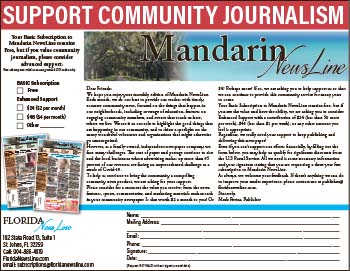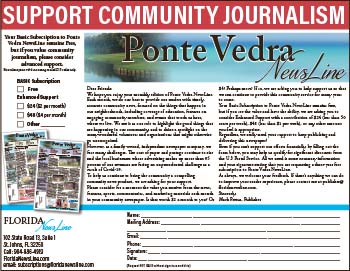By Martie Thompson
editor@floridanewsline.com
There is something easy you can do to help migratory birds on their long spring and fall journeys: turn off your lights.
For these birds, undertaking the long migration journey comes with many challenges, but one hurdle has grown significantly over the past several years and has had an impact on bird populations: the increase of artificial light shining into the night sky. In an effort to call attention to this cause, the Jacksonville Zoo and Gardens, Duval Audubon Society, and St. Johns County Audubon Society have partnered to launch Lights Out Northeast Florida.
“Because these birds migrate at night and use the stars and moon as directional cues, the bright lights on our homes and buildings can attract and disorient them on their journey,” said Amy Koch, president of St. Johns County Audubon Society. “The loss of birds during their migration is a problem that people can help mitigate, and that’s why we decided to come together to inform everyone about the issue and to share ideas about what we can do together in our Northeast Florida community to help save birds.”
North Florida is the second-largest migration site along the Atlantic Coast. According to the National Audubon Society, 70 percent of North American bird species are migratory, and 80 percent of those species migrate at night — primarily small, colorful songbirds.
“These are the songbirds we see regularly during spring and fall when they stop to rest and refuel on the thousands-of-miles-long journey to their breeding or wintering grounds,” said Carol Bailey-White, president of Duval Audubon Society.
The purpose of Lights Out Northeast Florida is to inform, encourage and empower the community on ways they can reduce their impact on migratory birds. The group shares these tips to start implementing
now for the Fall Migration, from September through November, and later in the Spring Migration, from February until May:
• Turn off lights during the darkest period of night, between 11 p.m. and 6 a.m.
• Direct lights to point downward, instead of upward into the sky.
• Switch floodlights to timed lights or motion sensor lights.
• Encourage businesses to turn off their lights or reduce the amount of time their lights are on at night.
“We are excited to partner with our two local Audubon Societies. This is an incredible effort that can only be accomplished by working together, using scientific data and sharing that information with an easy and direct way for our communities to make an impact,” said Mike Taylor, Curator of Birds, Herps and Others at Jacksonville Zoo and Gardens. “We are excited to launch this program, growing our community and making sure the colorful songbirds at our feeders continue to pass through without interruption and invite them back season after season.”
About Jacksonville Zoo and Gardens: For more than 100 years, the Jacksonville Zoo and Gardens has aimed to inspire the discovery and appreciation of wildlife through innovative experiences in a caring environment. The Jacksonville Zoo and Gardens is a nonprofit organization and a portion of every ticket sold goes to the more than 45 conservation initiatives Jacksonville Zoo and Gardens supports around the world and in Northeast Florida. Visit jacksonvillezoo.org for more information.
About Duval Audubon Society: Founded in 1939, Duval Audubon Society is one of 45 chapters of Audubon Florida, and a member of the National Audubon Society. Duval Audubon Society currently has 1,000 members in Clay, Duval, and Nassau counties and is a 501(c)(3) non-profit organization. Visit duvalaudubon.org for more information.
About St. Johns County Audubon Society: Established in 1979, St. Johns County Audubon Society is a local chapter of the National Audubon Society with more than 550 members. A non-profit 501(c)(3) organization, St. Johns County Audubon promotes the enjoyment of the 335+ species of birds found in St. Johns County with bird walks, field trips, educational seminars, and events speakers. Visit stjohnsaudubon.com for more information.
Photo courtesy Connie Long
Indigo bunting









